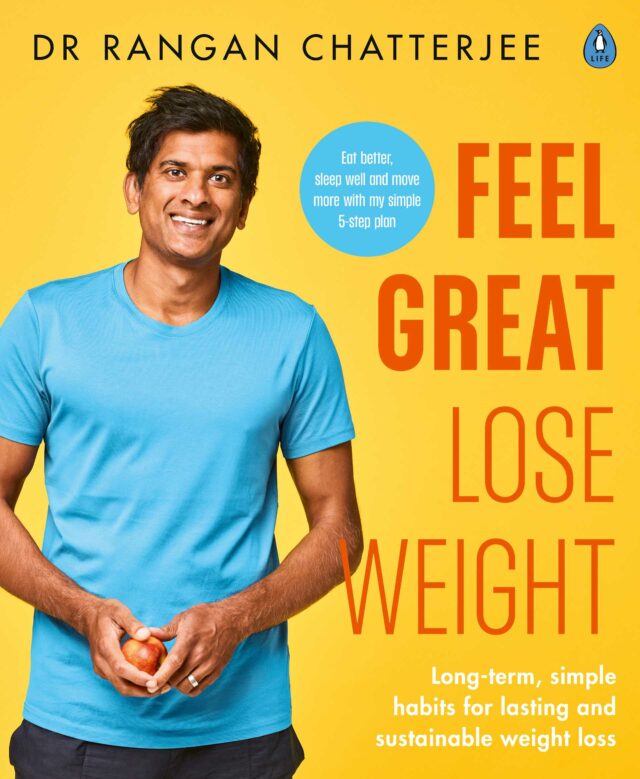A year ago, many of us were commuting to work, hitting the gym and getting out and about with friends. But since March 2020, we’ve been moving less, sleeping less and facing anxiety, loneliness and work-related stress on an epic scale. And it seems our physical wellbeing – in particular our weight – is suffering.
“For most of us, the last year has been the most stressful in living memory,” says TV presenter and podcaster Dr Rangan Chatterjee. “Given that many of us eat more when we’re stressed, of course many of us have put on weight. People use food to treat their sadness, their stress and their loneliness.
“We’re sleep-deprived, which makes us crave more calorie-dense foods. We’re also stressed out in our work, family and home lives, which makes our bodies think we’re in a hostile place, so they hold on to more fat. On top of all that, it’s hard for many of us to get easy access to healthy and affordable wholefoods.”
Last year a major study by King’s College London, in partnership with Ipsos MORI, revealed that a staggering 48% of people reported putting on weight during the first lockdown. As we continue to grapple with economic uncertainty, work stress and our upturned lives, it’s certainly all too easy to turn to sugary, stodgy or salty meals and snacks.
But a poor diet makes us feel sluggish, impairs our performance and of course obesity has links to a host of health conditions too. Add to that Public Health England’s estimation that having a BMII of 35-40 could increase a person’s risk of dying from Covid-19 by 40%, and it paints a gloomy picture.
So, how do we reset the balance, restore our healthy habits and improve our productivity into the bargain? Here, Dr Chatterjee gives some of the great advice from his brilliant new book, Feel Great, Lose Weight.

Detox your environment
First up is the work environment. If you’re still going to your regular place of work, think about the food on offer. Is there a vending machine, or cafeteria selling plates heaped with stodgy food?
“From nearly two decades spent working within the NHS, I know that our work environments can be places of near-constant temptation,” says Dr Chatterjee.
“It’s a sad fact that 57 per cent of NHS employees are either overweight or obese. These are amazing people who’ve devoted their lives to looking after others, and yet their work environments are making it challenging for them to look after themselves.
“Your environment exerts a powerful influence on the choices you make. Employees who wish to make healthy choices are constantly having to fight their environment. And the environment usually wins. Your home and, if possible, work environments should be stripped of temptations and filled with healthy nudges. This is one of the most powerful and effective things you can do.”
So, if you’re still going into your usual place of work, try taking your own home-cooked food. Include an emergency snack pack for those times when you’re really hungry – nuts, carrots and houmous and eggs are great options. And if you’re working from home, don’t keep junk food in the house.
“If the environments outside our homes made the healthy choice the easy choice, millions of us would be healthier and happier,” adds Dr Chatterjee. “And it is not just the health of the individuals that would benefit. Employers would benefit from increased performance and less absenteeism, and schools would have happier and more engaged students.”
Step off the blood sugar roller coaster
What you eat for breakfast can seriously impact your productivity, as well as the food choices you make for the rest of the day. “If you’re time poor, it’s easy to grab something easy like granola, but sugary foods send you on a blood sugar rollercoaster,” says Dr Chatterjee, whose ‘Feel Better, Live More’ podcast has been downloaded over 23 million times. “They can affect your mood, concentration and hunger.”
This can impact your performance at work, plus it can trigger cravings for mid-morning biscuits, carb-heavy lunches and chocolate as an afternoon pick-me-up.
To avoid this, Dr Chatterjee suggests experimenting with eating healthy savoury foods for breakfast – think of it as having your ‘dinner’ foods in the morning. This could be anything that keeps your blood sugar balanced, such as goat’s cheese with roasted veg.
When one patient tried this, he found it lifechanging. “He didn’t feel snappy or shaky,” Dr Chatterjee reveals. “His concentration levels were high. He used to think he performed well at work, but after a few weeks of his new dinner-breakfast he realised his work had been seriously sub-par. His cognition was now in a different league.”
Working late? Eat earlier
If you regularly work late, Dr Chatterjee suggests trying to eat your evening meal during an earlier break. Not only will it help your body to process the food better, but it’ll help your sleep too.
“If you eat a meal when your body isn’t geared up to receive it, it’s going to struggle,” he says. “Around three hours before bedtime, the sleep hormone melatonin should start to flood your system, making you feel tired. The same hormone tells some of your organs to begin shutting down for rest, including ones that affect how you process food and store it as fat. Get into the habit of eating nothing for two, or preferably three, hours before bedtime. If you want to get to a healthy weight, it’s much better to work with your body and not against it.”
Do a bedroom detox
It’s not just our work environment that matters – our bedroom environment is also key to our wellbeing. Set up poorly, it can impact our sleep, which in turn depletes our energy, affects our mood and makes it harder to deal with life’s stresses. On top of that, tiredness affects our productivity and performance too, plus it makes us far more likely to reach for unhealthy food.
All this is more important in the midst of the pandemic, when Covid-19 has sent insomnia levels skyrocketing. When King’s College London carried out a survey to ascertain the impact the first lockdown was having on sleep, half the respondents said it was more disturbed than usual.
“Prepare your sleep environment,” says Dr Chatterjee, who has just launched a new wellbeing show on BBC Radio 2. “Make it easier to fall into a deep, relaxing sleep by removing temptations from your bedroom, such as your laptop. One study found that looking at a tablet before bed can suppress levels of the sleep hormone melatonin by a whopping 20–30 per cent.
“Charge your smartphone outside your bedroom and if you need an alarm, pick one up from a charity shop or online. Make sure your curtains are effectively blocking out light or think about getting some blackout blinds. Eye masks, ear plugs and blue light-blocking glasses can also be helpful.”
Feel Great Lose Weight: Long term simple habits for lasting and sustainable weight loss is published by Penguin Life (£16.99).
Listen to Dr Chatterjee’s new wellbeing show on BBC Radio 2 and BBC Sounds, Sundays 10pm-midnight.

Sophie Barton
Sophie Barton is our Features Editor. She a journalist and editor with 20 years’ experience in the national media, specialising in wellbeing and lifestyle.




